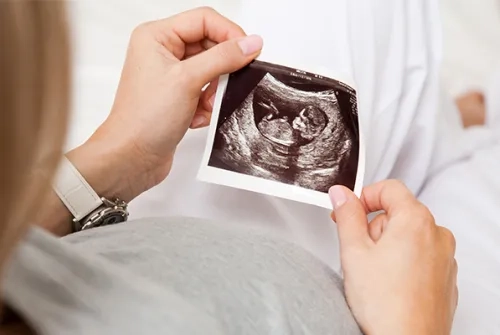Alo Yeditepe
Alo Yeditepe
What Happens at 28 Weeks of Pregnancy?
Now that you are in the last trimester of your pregnancy, time is passing quickly. So, what happens during pregnancy week by week and what happens in the 28th week of pregnancy? How big is a 28-week baby? What are the changes in the mother during the 28th week of pregnancy? What are the changes in the baby at 28 weeks of pregnancy?
Yeditepe University Hospitals Gynecology and Obstetrics Department Head and IVF Specialist Prof. Dr. Erkut Attar answered these questions about the 28th week of pregnancy.
How Big is a 28-Week Baby?
Your baby now weighs just over 1 kilogram and measures at least 37.6 centimeters from head to heel.
Baby Development at 28 Weeks of Pregnancy
Your baby's eyes are now surrounded by eyelashes. Soon the muscle fibrils that make up your baby's iris will develop in color and texture, but the true color of the eye will be apparent within a few weeks after birth.
A white, oily substance called myelin is gradually coating your baby's spinal cord and the nerves that come out of it. This process is called myelination and it continues throughout your pregnancy and your baby's first year of life. Myelin is important because it increases the speed at which messages travel between your baby's brain and the nerves in its body. Myelin is also a protective layer. The nerves that support your baby's movements are covered with myelin before the nerves that sense your baby's sensations.
Changes in the Mother at 28 Weeks of Pregnancy
Due to increased skin tension or changing hormones, a quarter of women complain that their skin itches during pregnancy. To soothe your skin, try to avoid chapping as much as possible. Keep your skin moisturized and avoid very hot baths. If the itching is very uncomfortable, you can rub a few ice cubes on your skin to help soothe it or take a cold shower.
In rare cases, itchy skin can be a symptom of a condition called "cholestasis of pregnancy". Although rare, cholestasis of pregnancy is a serious condition. Although itching is not usually something to worry about, you should tell your doctor about it just in case.
At your next pregnancy follow-up appointment, your doctor should ask you for a blood test to measure your iron levels. If your iron levels are low, he or she will recommend iron supplements to make sure you and your baby get the necessary nutrients.
Another test done this week is to screen for the rh antigen in couples with blood incompatibility. If you are Rh-negative, you may need an injection called anti-D.
About
Faculty and Year of Graduation:
Istanbul University, Cerrahpasa Medical School 1986
”
See Also
- Contraceptive Methods: Birth Control and Effective Protection Options
- Genetic Diagnosis in IVF Treatment
- What Happens at 3rd Weeks of Pregnancy?
- What Happens at 2nd Week of Pregnancy?
- What is Endometriosis? What are the Symptoms of Endometriosis?
- What is Pelvic Floor? What are Their Duties?
- The Most Common Diseases in Women
- What is Hysteroscopy? Hysteroscopy Usage Areas
- Early Menopause and Ovarian Failure Can Be Prevented
- Polycystic Ovary Syndrome and its Treatment
- Electromagnetic Stimulation in the Treatment of Endometriosis and Infertility
- Causes of Female Infertility
- Chronic Pelvic Pain
- What is Polycystic Ovary Syndrome/PCOS?
- Postpartum Period
- The Chance of Becoming a Father Increases with Microchip Technology
- Thanks to the Ovarian Rejuvenation Method, She Counts the Days for Birth!
- Some Patients Go Through Menopause Even at the Age of 15
- Useful Bacteria Increases IVF Success
- Polycystic Ovary Syndrome Can Occur If the Bacteria in the Gut Are Not Functioning Well
- Imaging Methods During Pregnancy
- After 16 Years, She Wanted to Be a Mother Again; She Experienced the Shock of Her Life
- These Diseases Affect Women Differently Than Men
- Beware of Chocolate Cyst! It Affects 1 in 10 Women
- Causes of Male Factor Infertility
- The Effect of Advanced Age on IVF Treatment
- Infertility
- Polycystic Ovary Syndrome
- Early Menopause
- Blocked Fallopian Tube
- Vaginismus
- Low Ovarian Reserve (AMH)
- Which Methods Increase Success in Treatment of Infertility?
- Intrauterine insemination (IUI)
- Microinjection
- Egg Cryopreservation
- Assisted Hatching
- Micro-chip
- Pre-implantation Genetic Diagnosis
- Endometriosis
- Co-Culture
- Ovarian Rejuvenation / PRP
- This Problem Ruins the Lives of One in Every 10 Women
- Prof. Dr. Attar: Endometriosis Can Be Associated With Some Chronic Diseases
- What Happens at 38 Weeks of Pregnancy?
- What Happens at 37 Weeks of Pregnancy?
- What Happens at 36 Weeks of Pregnancy?
- What Happens at 35 Weeks of Pregnancy?
- What Happens at 34 Weeks of Pregnancy?
- What Happens at 33 Weeks of Pregnancy?
- What Happens at 32 Weeks of Pregnancy?
- What Happens at 31 Weeks of Pregnancy?
- What Happens at 30 Weeks of Pregnancy?
- What Happens at 29 Weeks of Pregnancy?
- What Happens at 27 Weeks of Pregnancy?
- What Happens at 26 Weeks of Pregnancy?
- What Happens at 25 Weeks of Pregnancy?
- What Happens at 24 Weeks of Pregnancy?
- What Happens at 23 Weeks of Pregnancy?
- What Happens at 22 Weeks of Pregnancy?
- What Happens at 21 Weeks of Pregnancy?
- What Happens at 20 Weeks of Pregnancy?
- What Happens at 19 Weeks of Pregnancy?
- What Happens at 18 Weeks of Pregnancy?
- What Happens at 17 Weeks of Pregnancy?
- What Happens at 16 Weeks of Pregnancy?
- What Happens at 15 Weeks of Pregnancy?
- What Happens at 14 Weeks of Pregnancy?
- What Happens at 13 Weeks of Pregnancy?
- What Happens at 12 Weeks of Pregnancy?
- What Happens at 11 Weeks of Pregnancy?
- What Happens at 10 Weeks of Pregnancy?
- What Happens at 9 Weeks of Pregnancy?
- What Happens at 8 Weeks of Pregnancy?
- What Happens at 7 Weeks of Pregnancy?
- What Happens at 6 Weeks of Pregnancy?
- What Happens at 5 Weeks of Pregnancy?
- What Happens at 4 Weeks of Pregnancy?
- What Happens at 1st. Weeks of Pregnancy?
- Considerations for Embryo Transfer
- What Causes Menstrual Irregularity, How Is It Treated?
- Success in IVF after 43 Decreases to Five Percent
- Does Pregnant Coronaviruses Affect?
- Most Frequently Asked Questions During Pregnancy
- 1 in 10 Women Have This Problem; It Can Lead To Infertility
- Effective Results Can Be Achieved with PRP in Women with Low Egg Count
Alo Yeditepe




